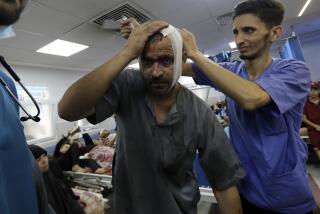Toll in Cairo slide rises to 32
Gamal Kamal Mohammed searched Sunday for a brother who had left their home village years ago for the big city to work in a juice shop; he lived with a wife and daughter in a shantytown beneath cliffs the color of butterscotch and honey.
Tons of stone and rock broke away from the Muqattam cliffs Saturday, killing at least 32 people, injuring dozens and leaving as many as hundreds missing in the ruins of an eastern Cairo slum. Rescue crews worked for a second day with pickaxes and heavy machinery to reach those trapped in about 50 smashed houses and apartment buildings.
“I asked at hospitals, but his body has not been found yet,” said Mohammed, who traveled with 10 cousins from Upper Egypt to search for his brother, Abdel.
One of the cousins added: “We went to dig for ourselves, but we found nothing. Today, the police evacuated us and said they would search for the bodies. . . . We won’t leave here until we find him, even if he is just a pack of bones.”
Police cordoned off the Douaiqa shantytown. Ambulances moved through as families from nearby houses, fearing more boulders would tumble from the weakened cliffs, loaded trucks and carts with possessions and fled.
Many of them were like Abdel Mohammed, villagers drawn to the city, living on low-paying jobs and settling into illegal slums while waiting for subsidized apartments. Mohammed has been waiting a decade for an apartment.
The Egyptian government wants to demolish neighborhoods such as Douaiqa, but with a scarcity of subsidized apartments, the slums ringing this city of 17 million people seem to be expanding overnight. President Hosni Mubarak announced that the government would compensate the families of Douaiqa. But many blamed the regime for not moving them earlier and charged leaders with neglect for the slow response of emergency crews Saturday.
“The government only acts when a catastrophe happens. They do not care because the people who live here are poor,” said Nasser Shaaban, a textile worker whose tenement is one block from the limestone cliffs. “They cannot feel for us because they have very comfortable lives. We are almost dead here while other people live in villas and huge houses.”
Shaaban and his wife, Amal, live with their three children in a room with broken walls, a sagging ceiling and one bed. He earns $75 a month, not enough to weather the nation’s relentless inflation and afford an apartment without a subsidy. So the family lives amid cliffs made brittle and dangerous by quarry mining and the sewer and water lines that thread the illegally built, crowded slum.
“We filed several petitions asking for a [government] apartment, but we were told that we should pay hefty bribes to be granted one,” said Amal Shaaban. “Where can we get the money to pay such bribes? Shall we sell our kids out?”
Many residents walked through the crowds and traffic in a daze Sunday, shifting from anger to tears, punching the air, yelling into TV cameras and at riot police. The boulders had blotted out what they knew, changed the topography of a neighborhood so that streets and alleys resembled dry riverbeds of scattered stone. One woman, Gameela Zarif, could no longer hold in her anger:
“Our neighbors and people crumble under the rocks while [Mubarak] still holds to his throne,” she said. The government “comes to rescue us after we’re already gone.”
Nada Abdel Moneim just wanted her daughter and grandchildren back. Sitting in a black robe and blue veil, Moneim was stunned at how, in a few hours, joy could veer to tragedy. She had traveled from her home in Fayoum, about 65 miles southwest of Cairo, to spend the weekend with her daughter, Fayza Hemdan, who moved here seven years ago with her new husband.
“I spent the night with her. I had supper with her and her husband and kids,” she said. “We were laughing all night until 1 a.m. Then, I left her at 6 a.m. By the time I got home in Fayoum, somebody called me and told me that the rock fell on my daughter’s house so I ran back to Cairo.”
Some of Hemdan’s things were found amid crevices and rubble: her mattress, her refrigerator and her documents and pictures, including one showing a young woman with long hair in an off-white blouse and black skirt. But there has been no sign of Hemdan, her husband and her two young sons. Moneim cursed and cried; beyond her, stones clattered as hands and shovels dug.
“Oh, people! I am looking for my daughter,” she said. “Though I know she is dead.”
--
jeffrey.fleishman @latimes.com
More to Read
Start your day right
Sign up for Essential California for news, features and recommendations from the L.A. Times and beyond in your inbox six days a week.
You may occasionally receive promotional content from the Los Angeles Times.







